- Home
- Joan Lowery Nixon
Shadowmaker Page 3
Shadowmaker Read online
Page 3
There were a few groans, and a couple of guys put their heads down on their arms.
“Could I sharpen my pencil?” a girl in the back row asked.
“Not now,” Mrs. Walgren said. “As usual, I’ll read a few of the best entries to inspire the rest of you.”
I sat up straight, cold needles darting up and down my spine. She couldn’t do that, could she? What about privacy? Mrs. Gantner gave us privacy. I took it for granted that all teachers would teach journal writing the same way. For just an instant I closed my eyes as I realized what I had written.
Don’t panic! I told myself. You’re a new student. She isn’t likely to read from your journal. But I remembered that brilliant smile she gave me and understood what it had meant. I wished I could slide under my desk and disappear forever.
We heard Billy Don Knipp’s description of the last ten minutes of a football game, and I discovered that Billy Don, the big guy with the embarrassed look on his face, played halfback for Kluney High.
“Although your journals are basically supposed to deal with your current thoughts and feelings, it’s perfectly all right to relive an earlier experience and write about it,” Mrs. Walgren said when she’d finished reading Billy Don’s journal entry. “Sometimes the experience becomes even more definitive over the passage of a few months.” She smiled as she handed Billy Don’s journal back. “I remember that game. November sixth, a home game against Crossview High, and we won, twenty-one to seven.”
The journal belonging to a tall, slender, dark-haired girl named Julie Bach was Mrs. Walgren’s next choice. Julie had described how she’d helped with the birth of a calf. I thought what she had written was good. Really good. It belonged in the school’s literary magazine—if they had one.
I slunk down in my chair as Mrs. Walgren picked up the next journal—mine. “Katherine Gillian,” she said, and that friendly smile flashed again. “I’ve read many of her mother’s articles and know what a fine writer she is. And now I can see that Katherine … Are you called Kate? Katie?”
I mumbled and nodded, and she went on. “That Katie has inherited her mother’s writing talent and undoubtedly intends to be a writer too.”
A couple of kids turned around and stared at me. I wanted to tell Mrs. Walgren she was jumping to conclusions. Why should I have to be a writer just because my mother was a writer? But I kept my mouth shut.
“Katie has reached down and written about her feelings in free verse,” Mrs. Walgren said. “I want you all to pay attention to the depth she achieves and the unusual metaphor she uses.”
My face grew hot, and it was all I could do to keep from groaning aloud. Nobody was going to like what I’d written.
Mrs. Walgren cleared her throat and began to read:
New girl in school?
Who says I’m new?
I’m the same sparrow I’ve always been,
but I’ve been plucked from my nest
and dropped into a town too small,
with roads too dusty and a sea too gray.
I cry out because the fall has lamed me,
but no one hears.
Gulls squabble over a dead fish,
and cluster tightly to pick the bones.
Staring with black, beady eyes
at the wounded sparrow who flaps into their unity,
they fly off in a pack,
squawking, “She’s new! She’s new!”
The sparrow limps alone, and no one cares.
Mrs. Walgren closed my journal, brushed a stray wisp of hair from her eyes, and nodded toward the class. “What do you think of the metaphor?”
“What’s a metaphor?” Billy Don asked.
I wanted to bury my head in my hands. Billy Don was probably the only person in class who didn’t understand I was writing about them.
Mrs. Walgren explained what a metaphor was so that even Billy Don should understand, but the puzzled expression on his face showed that he still hadn’t got it.
Julie gave me an appraising look, then raised her hand. “I can understand somebody coming to a new school and not knowing anyone and feeling different, but I don’t understand why the sparrow was lame.”
“Good question. Perhaps the lameness symbolizes a feeling of inadequacy.” She nodded in my direction. “Katie, would you like to explain?”
No, I wouldn’t like to explain! But I had no choice. “In Houston,” I said as I carefully studied the scratches in the floor, “I studied ballet in school, and I practiced the exercises, the positions, and the movements for an hour or two every day. In Kluney there’s no one I can study with.”
“That is tough,” Julie said. I looked up sharply, but there was genuine sympathy in her expression.
The boy sitting in front of me turned with a smirk, then raised his hand.
“Yes, B.J.?” Mrs. Walgren said.
“Maybe that sparrow doesn’t belong on the beach with the gulls,” B.J. said. “She doesn’t have any business being there. It’s not her territory. She needs to go back where she belongs.”
Mrs. Walgren looked distressed. She opened her mouth, but didn’t have time to say anything before Billy Don spoke up.
“Sometimes sea gulls can get mean, especially if you bother them while they’re fighting over their food,” he said. “I know a guy who got pecked all over his head. He coulda lost an eye.”
“Oh, gross!” someone complained. “Why do we have to talk about sea gulls anyway?”
Mrs. Walgren glanced from face to face. In a firm tone of voice she said, “I think it’s important for each of you to think about this poem and the author’s use of metaphor in describing her thoughts and feelings. This is an excellent use of the journal.”
She began to pass back the journals from the front desk in each row, and to my great relief, everyone’s attention was diverted to the suggestions written in their own journals.
B.J. turned and shoved the stack of journals toward me with such force he slammed them into my shoulder. “Any time you want, you can leave,” he whispered. “No one’s gonna miss you.”
I simply took my journal from the pile, then turned and passed the rest to Tammy, who was behind me.
Tammy’s eyes crinkled as she leaned close. “Once Mrs. Walgren read my journal entry aloud, and someone laughed, and I thought I was going to throw up.”
I realized that Mrs. Walgren was now talking about Shakespeare’s Julius Caesar and was writing an assignment on the board, so I pulled out a pen and began copying the information into my notebook.
Just before the bell rang Mrs. Walgren said, “Billy Don and B.J., Katie and Lana Jean … Will you come up to my desk, please?”
Now what? I wondered, but, as the others were doing, I gathered up my books and went to stand before Mrs. Walgren’s desk.
Mrs. Walgren smiled her friendly smile at all four of us, as though she really liked us. I wondered how she could. “B.J.,” she said, “you and Billy Don are friends.”
“Not so you’d notice,” B.J. muttered.
“Nonsense. You’re practically next-door neighbors, so you should be friends. But that’s beside the point. B.J., I want you to work with Billy Don on his journal.”
“You said what I wrote was good!” Billy Don complained.
“It was, but your entire journal is filled with descriptions of football games. I want you to expand your horizons. I want you to look inside yourself and recognize your emotions. I want you to know how you feel.”
“That’s easy. When we win, I feel good.”
“B.J., you understand your assignment. Begin by trying to interest Billy Don in other topics.”
She turned to Lana Jean and me. “Girls,” she said, “you don’t live very far from each other. I mean, it’s a long walk, but it’s not like you’d have to drive to get to each other’s house, so I’m going to pair you off.”
I must have looked as wary as I felt, because Mrs. Walgren tilted her head toward me and said, “Katie, you have a writing talent that could
be shared with others. I have hopes that Lana Jean can also learn to express her feelings about a variety of topics. The topic she has chosen is so inappropriate I had to stop reading her entries. My directions and suggestions haven’t seemed to reach her, so I want you to get together with her outside of school and work on her journal. It’s the best way I can think of to help her get her grades up to passing.”
The last thing in the world I wanted to do was get together with Lana Jean. Sure, she’d been the first to be friendly to me, but I needed my time for homework and ballet practice and to make other friends.
Lana Jean had looked hopeful at first, but now her forehead puckered, and her lower lip jutted out. “Oh, no, I can’t after school,” she said. “I have a job.”
“What hours do you work?”
“From five to ten, all during the dinner hour.” Her smile flickered timidly as she glanced at me and said, “It’s at Kennedy’s Grill. I work in the kitchen. They’ve got real good food. You and your mama ought to come by sometime.”
I hoped their kitchen was cleaner than Lana Jean.
Shyly, she asked me, “What about weekends? Could you help me any time on Saturday? Or Sunday afternoon?”
Guilt won out. I gave up and said, “Sure. How about Saturday afternoon?”
“Fine!” A pleased satisfaction spread over Mrs. Walgren’s face like syrup on a pancake. “Then it’s all settled. You can work out the times yourselves.” She made a little shooing motion toward the door. “Hurry, or you’ll all be late to your next class.”
The other three scattered down the almost empty hall, but I paused for a minute, trying to figure things out. No matter what I wanted to do, it didn’t seem to matter. I was stuck here in Kluney High School until Mom’s novel was written.
No alternatives. No choices. I took a deep breath and went off to class.
CHAPTER THREE
Algebra III was the first class to let out before lunch period, so I arrived before Tammy did. By the time I’d carried my tray through the checkout line there was still no sign of Tammy. Hoping she’d find me, I picked a nearly empty table, but almost immediately a tray was plopped down next to mine, and Lana Jean slid into the seat.
“Hi,” she said, and began rattling on about some guy named Travis Wyman on whom she had a king-size hangup.
Tammy and Julie came into the cafeteria. Tammy looked around, spotted me, and pointed to a table where someone was saving seats.
I just shrugged and shook my head. I couldn’t suddenly get up and leave Lana Jean, and I realized that most of the seats at our table had filled up.
Lana Jean, busy eating and talking at the same time, hadn’t noticed. “He’s a junior,” she said, “and he’s in Blitz.”
“Who’s in Blitz?” I took a large bite of macaroni and cheese.
“Haven’t you been paying attention? Travis is in Blitz.”
“Sorry. What’s Blitz?” I asked, although I really didn’t care.
“Shhh! Not so loud! It’s a secret club,” Lana Jean whispered. “Nobody’s supposed to know about it or who’s in it, but one night Travis was talking with B.J., who works in Kennedy’s kitchen the same nights I do. Travis and B.J. were talking and smoking in the alley outside the kitchen door. B.J. left the door a little bit open, so I listened in, and that’s how I know that Travis and B.J. and Duke Macon and Delmar Johnson are the members. Travis and Duke and Delmar are a year older than B.J. He was a tagalong who kind of pushed his way in, and now he acts real bossy and important when he’s with the other guys.”
I gave her a quick glance, but she shrugged. “Okay, so I was spying, kind of,” she said, “but that’s because I’m so crazy about Travis.”
“I don’t even know who Travis Wyman is, but I bet he wouldn’t like you spying on him.”
“I shouldn’t have said spying. It’s not really spying. It’s just sort of watching how he walks across campus and who he talks to and stuff like that. And I keep hoping that maybe someday he’ll notice me. Do you believe in love at first sight?”
“I don’t know. I suppose.” I poked at my flavorless red Jell-O salad and felt so sorry for Lana Jean in her impossible dreamworld that I tried to make amends. “Tell me more about Travis’s secret club,” I said.
“No. We shouldn’t even be talking about it.”
That was fine with me. I polished off something brown and lumpy that was supposed to be a bean and beef burrito and washed it down with a long swallow of Coke.
We ate in silence for a couple of minutes. Then Lana Jean said, “Guys are always having to prove themselves.”
“What do you mean?”
“I don’t know. That was just part of what Travis and B.J. were talking about.”
“I guess we all have to prove ourselves, one way or another.”
“I don’t think that’s what they meant.”
“Why don’t you just forget it? You weren’t supposed to be listening in anyway. Besides, I don’t want to talk about B.J. I can’t stand him.”
Lana Jean nodded. “Yeah. He’s mean, just like his dad. B.J.’s mom ran off a few years ago and nobody blamed her, except they thought she should have taken B.J. with her to protect him from his father.”
The bell rang, and I gulped the rest of my Coke, eager to get away from Lana Jean, eager to make it through the rest of the day.
* * *
I came home to find that Mom had discovered electrical outlets outside the house and had rigged up some two-hundred-watt lights. As soon as it was dark she tested them by flipping the switch inside my room near the French doors, and the yard became almost as bright as if it were daylight.
Mom looked awfully pleased with herself. She ran her fingers through her short, curly hair and said, “That ought to keep any prowlers away—that and the extra locks I installed. Did you see what a good job I did?”
“It looks great.”
“I wish I’d thought of installing locks and lights while we were working to clean this place.”
“I’m sorry you had to do all this stuff instead of work on your novel,” I said. The sooner she finished her novel, the sooner we’d get back to Houston. “Keep working on the book!” I wanted to shout at her.
“Doing grunge work wasn’t so bad,” she told me. “I was stuck on a chapter anyway, and while I was putting up the outside lights the problem solved itself in my mind. I wrote the scene this afternoon, and I like it. I really feel good about it.” With barely a pause she asked, “How was school today?”
“Okay,” I said, and then I got an idea. “Do you have an extra spiral notebook?”
“There are five of them in the bottom desk drawer. Help yourself.”
“I just need one,” I said, and went off to get it. I desperately needed to put my thoughts on paper. But there was no way in the world I was going to share those thoughts with Mrs. Walgren, no matter how kind she tried to be, so I’d keep two journals—one for her and one for me.
I sat on the front porch steps with both journals on my lap and glanced both to the right and the left, studying the curve of shoreline in this wide, isolated bay. There was not a single house in sight, not even a fisherman or kids playing on the sand. At the moment I appreciated the peace and quiet.
In this part of Texas it was already beginning to grow warm and a little sticky, but a light breeze curled around me, licking damp tendrils of hair at the nape of my neck. The salt from the sea tickled my nose, and I wished I could run to the shoreline and dance through the foam.
Well, why not?
I tugged off my shoes, tossing them aside, and ran barefoot down to the wet, packed sand. I bent to one side, then the other, stretching to my toes, touching my nose to my knees, limbering my muscles, and testing their strength in pliés before I rose into the slow movements of the adage.
I didn’t need music. The music of Swan Lake I carried with me in my heart, and it blended with the sucking whoosh and splash of the small waves and the rush and hiss of the foam. It rose up from
my toes throughout my body—blue, green, and gold notes swimming through my head until I whirled and leaped in grand allegro across the sand, kicking up rainbow sprays as I danced and danced and danced.
A discordant sob exploded, and I realized that my cheeks were wet with tears.
The music of the dying swan soared into the broken gap, filling it and rippling along my shoulders and arms. Remembering the final movements, I bent my head and dipped my wings, preparing to settle down upon the sand, but in the distance the Lab barked, a door slammed, and the magic vanished. I plopped onto the sand, rested my head against one knee, and gave in to the tears.
“Oh, Katie.” I heard the ache in Mom’s voice and quickly raised my head, wiping my eyes on the back of my hands. “It was beautiful,” she said. “I watched … I’ve seen you perform, but this … this … Was it terribly wrong to take you away from your ballet lessons and your school?”
Slowly I rose from the sand and walked toward Mom. “I’ll pick them up again as soon as you finish your novel and we move back to Houston.” I smiled and tried to make my words light and teasing. “So stick with the writing, okay?”
“You’ve never spoken about wanting a career in ballet. You aren’t thinking of …? I mean, in ballet there must be a real dedication and hard work that can’t be broken for even a day. If I thought that—”
“No career,” I said quickly. “I haven’t wanted to be a professional ballerina. The dance … Well, it’s just something I … I like to do.” I looked down and became very busy brushing sand from my feet.
What I said seemed to satisfy her. As we reached the porch she stretched her arms over her head, rolled her shoulders, and massaged the back of her neck. “We’ve both put in a long day, and I don’t feel like cooking. Let’s go out and get something to eat.”
“Hamburgers?” My stomach rumbled.
“I don’t feel like hamburgers. Let’s try Kennedy’s Grill. I heard they have wonderful barbecued chicken.”

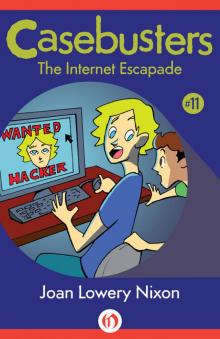 The Internet Escapade
The Internet Escapade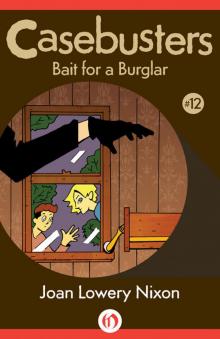 Bait for a Burglar
Bait for a Burglar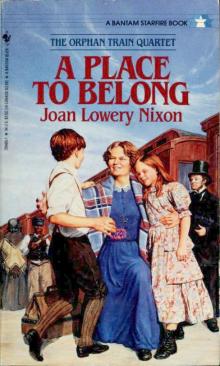 A Place to Belong
A Place to Belong Nightmare
Nightmare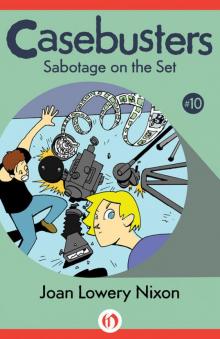 Sabotage on the Set
Sabotage on the Set The Other Side of Dark
The Other Side of Dark Whispers from the Dead
Whispers from the Dead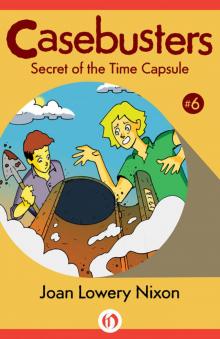 Secret of the Time Capsule
Secret of the Time Capsule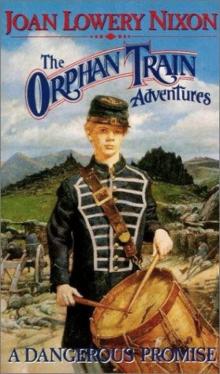 A Dangerous Promise
A Dangerous Promise Laugh Till You Cry
Laugh Till You Cry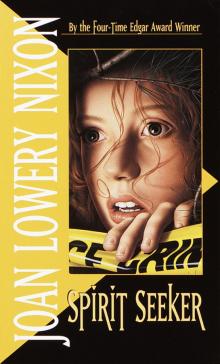 Spirit Seeker
Spirit Seeker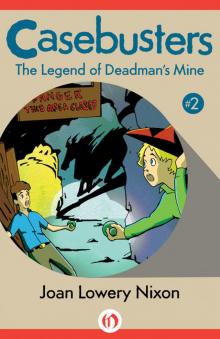 The Legend of Deadman's Mine
The Legend of Deadman's Mine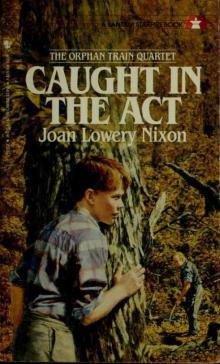 Caught in the Act
Caught in the Act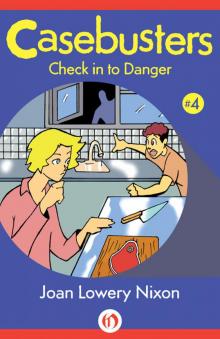 Check in to Danger
Check in to Danger Ellis Island: Three Novels
Ellis Island: Three Novels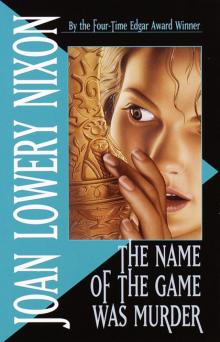 The Name of the Game Was Murder
The Name of the Game Was Murder The Haunting
The Haunting Lucy’s Wish
Lucy’s Wish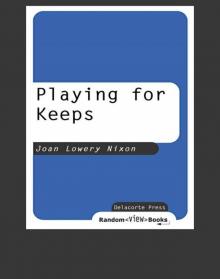 Playing for Keeps
Playing for Keeps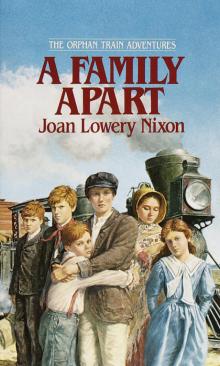 A Family Apart
A Family Apart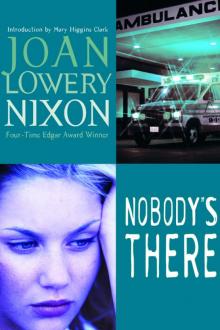 Nobody's There
Nobody's There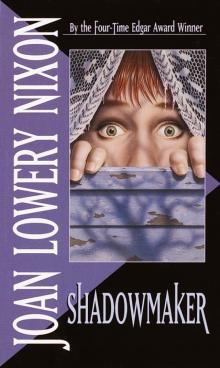 Shadowmaker
Shadowmaker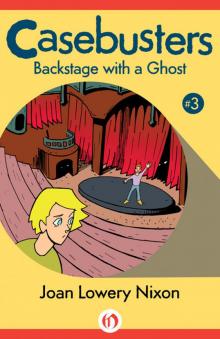 Backstage with a Ghost
Backstage with a Ghost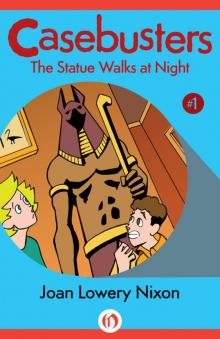 The Statue Walks at Night
The Statue Walks at Night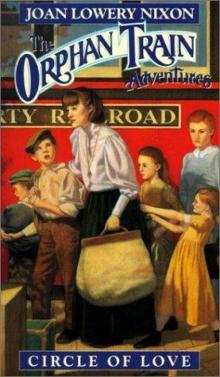 Circle of Love
Circle of Love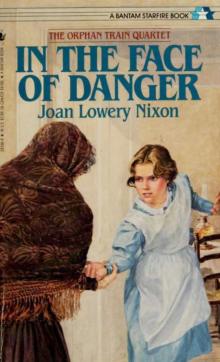 In the Face of Danger
In the Face of Danger Ghost Town
Ghost Town A Candidate for Murder
A Candidate for Murder The Weekend Was Murder
The Weekend Was Murder The Island of Dangerous Dreams
The Island of Dangerous Dreams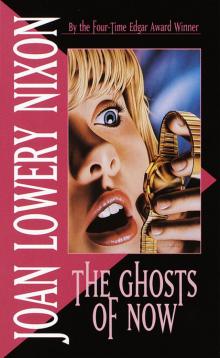 The Ghosts of Now
The Ghosts of Now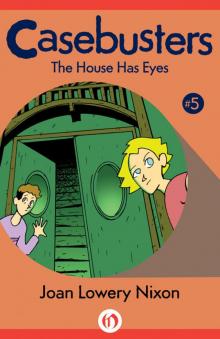 The House Has Eyes
The House Has Eyes The Dark and Deadly Pool
The Dark and Deadly Pool Keeping Secrets
Keeping Secrets Secret, Silent Screams
Secret, Silent Screams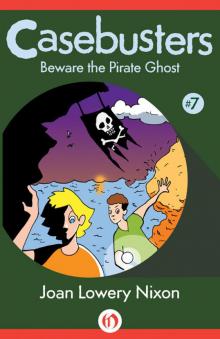 Beware the Pirate Ghost
Beware the Pirate Ghost Search for the Shadowman
Search for the Shadowman Haunted Island
Haunted Island